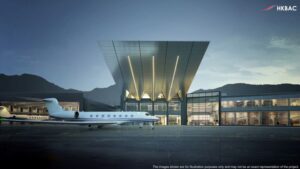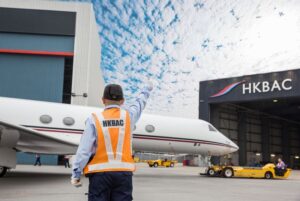Vivien Lau brings nearly two decades of aviation expertise to her role as the CEO of the Hong Kong Business Aviation Centre.
How did you come to work in business aviaton and at the Hong Kong Business Aviation Center?
I started my career as executive trainee in a conglomerate and got the opportunity to rotate to different business sectors. In one of my earlier assignments, I got to work in the airport. I just loved working with the people in the aviation industry because they were all so collaborative. Since then, I have never left the aviation industry.
Throughout my 18 years of experience in this industry, I had spent six years working in a joint-venture project to set up a passenger ground handling company in China, and then worked in air cargo and logistics business for nine years. Prior to joining Hong Kong Business Aviation Center (HKBAC), I was the chief executive officer of Jardine Aviation Services leading the business through the pandemic crisis. I joined HKBAC in July this year.
I’m proud to be part of the HKBAC team, and I’m looking forward to our continued long-term success. I’m particularly excited about the new chapter with our redevelopment project, which I believe will elevate HKBAC to another level—incorporating innovative design, a unique customer experience and operational excellence. This initiative will not only enhance our services but also position us for greater recognition in the industry.
What are your key responsibilities at HKBAC?
As HKBAC’s chief executive officer, I am responsible for overseeing the company’s business expansion and continuous delivery of premium services that meet our clients’ needs.
Looking ahead, with the completion of our redevelopment project in 2025, I will work closely with my team as we move into a new chapter of HKBAC. We will embark on a series of new initiatives to enhance the overall customer experience in our new facilities.
What are some of the biggest challenges currently facing the private aviation sector?
The business aviation sector is currently navigating a complex landscape marked by geopolitical conflicts and economic instability. These global trends present significant challenges, but they also offer unique opportunities.
Operating an FBO in Hong Kong comes with its challenges, particularly due to the competitive landscape. We must continually cater to a diverse clientele while adhering to high operational standards and navigating complex regulations.
As the market evolves, we recognize this as an opportunity to broaden our client base and tailor our offerings to meet diverse needs. At HKBAC, our focus on agility and adaptability ensures that we can navigate the complexities of the business aviation landscape and continue to deliver exceptional service to our clients.
How does HKBAC stand out in the competitive landscape of private aviation?

HKBAC has been established since 1998 and is committed to becoming the leading FBO in the world.
HKBAC has embarked on its terminal redevelopment project, with an investment of over HK$400 million, expected to be completed in 2025. Upon completion, HKBAC will double its handling capacity for business jet movements. The upgraded facilities will feature a refurbished and expanded executive terminal building. This upgrade includes improvements to customs, immigration, and quarantine processes, as well as a 26-metre-long canopy that will shield both aircraft and passengers from the weather.
The new support terminal will include expanded facilities to accommodate the growing demands for chartered flights, including group travel and pet flights. We are particularly excited to introduce specialized services for pet travel, ensuring that pets can travel comfortably and safely alongside their owners. This includes dedicated pet handling areas, experienced staff trained in animal care, and streamlined processes to facilitate smooth travel for pets, making HKBAC a pet-friendly choice in private aviation.
HKBAC also offers unique services such as the HKBAC JetLink Service, which provides streamlined transfers between business jets and commercial flights. This airside transfer service enhances customer experiences by reducing transfer time by one-third to just 30 to 50 minutes.
What emerging trends do you think will have the most impact in the next 5 years?
The aviation industry is witnessing new trends that I expect will shape its future, particularly the diversification of clients and the increasing popularity of charter flights.
The rise of various leisure travel charters, such as pet travel, corporate VIP events, family vacations, and group travel, along with the promotion of cultural, sports, and international events, is expanding our client base. This shift is driving greater market demand and new opportunities.
As many pet owners consider their pets as family members, pet-friendly charters are becoming increasingly popular, with demand continuing to rise. We are actively collaborating with relevant departments, such as the Agriculture, Fisheries and Conservation Department, to optimize the pet charter service process and enhance the overall experience for pet travelers.
The government’s active promotion of the mega event economy and its positioning of Hong Kong as a leading family office center presents unique opportunities for us. HKBAC, as the first point of contact for travelers and family office members entering Hong Kong, offers flexible services tailored to travelers’ itineraries, ensuring a positive experience that enhances their efficiency while in the city.
In alignment with national initiatives for low-altitude economic development, we are exploring business aviation connections to the Greater Bay Area and various provinces and cities in Mainland China. This initiative aims to enhance transportation links and stimulate economic activities between Hong Kong and the Mainland.
These trends signal a dynamic shift in the aviation landscape, presenting exciting opportunities for growth and innovation in the coming years.
How is HKBAC addressing the growing demand for sustainability in the aviation sector?

As a committed partner in the HKIA 2050 Net Zero Carbon Pledge, HKBAC is dedicated to advancing sustainable practices within the aviation sector. We actively pursue initiatives that reduce our carbon footprint and promote environmental stewardship.
We are transitioning from fossil fuel-powered vehicles to electric vehicles to lower greenhouse gas emissions. Our electric ground service equipment fleet includes aircraft tractors, belt loaders, potable water carts, and lavatory carts, all supporting our ground handling operations. HKBAC will continue to invest in suitable electric GSE to contribute to a cleaner and more sustainable aviation ecosystem.
We have established recycling programs and are working to reduce single-use plastics. Our ‘Green Corner’ facilitates the proper disposal of recyclable materials and encourages responsible waste management practices.
Additionally, our coffee capsule recycling program returns used capsules to the aluminium value chain for repurposing in products like car engines and bicycles. We also provide frontline team members with reusable water bottles and powdered sports drink mixes to promote hydration and reduce single-use plastic waste.
We encourage staff participation in suggesting carbon reduction initiatives within their areas.
To promote a greener workspace, we invite employees to bring plants to the office, enhancing air quality and creating a healthier, more aesthetically pleasing environment.
Hong Kong Airport Authority has been working with fuel suppliers to procure sustainable aviation fuel (SAF).
HKBAC has the technical and operational capacity to support this emerging change and will ensure that we can fulfil our customers’ needs once available. In addition, we are working with our fuel suppliers to provide options for carbon offsetting programs which can allow our customers to uplift fuel and offset their carbon emissions prior to SAF being fully available in Hong Kong International Airport.
Through these initiatives, HKBAC is committed to fostering innovation and responsible practices across the aviation industry, contributing to a sustainable future for aviation in Hong Kong.
What is the most valuable lesson you’ve learned throughout your career?
Aviation is a people industry. I like direct communications with all stakeholders. One of my top priorities is to stay closely connected with our staff, as people often feel hesitant to approach senior management.
To bridge this gap, I make it a point to reach out to frontline managers to gain insights into what’s happening on the ground.
Additionally, I prioritize meeting with customers, as they can provide valuable insights on the latest market trends.
These interactions are incredibly effective in helping me understand how to steer the company in the right direction within a highly competitive environment. By fostering strong relationships and listening actively, I can make informed decisions that benefit both our team and our clients.
Where do you see HKBAC in the next five years?

HKBAC is committed to becoming the leading FBO in the world. With the redevelopment project expected to be completed in 2025, we are going to redefine customer experience adhering to the world-class standard.
Business aviation is an integral, high-value segment of Hong Kong’s aviation industry, fully leveraging Hong Kong’s role as a double gateway connecting the mainland and international markets. Our aim is to excel as a super connector and super value-adder to strengthen Hong Kong’s position as an international aviation hub.
What advice would you give to someone interested in starting a career in business aviation?
I firmly believe that building strong relationships and focusing on service excellence are paramount for anyone aspiring to a career in business aviation.
Understanding clients’ needs, anticipating their expectations, and delivering a personalized experience are crucial to succeed in the sector.
Cultivating relationships with colleagues, clients, and industry partners is essential; these connections often open doors and create opportunities for collaboration and growth.
Additionally, a commitment to service excellence must be at the core of your professional ethos. In business aviation, every detail matters, and the ability to deliver high-quality service consistently can set you apart. This includes being adaptable, as client needs can vary widely, and embracing a can-do spirit to ensure their satisfaction.
I also encourage aspiring professionals to seek continual learning and development. The aviation sector is dynamic, with evolving technologies and regulations. Staying informed about industry trends and engaging with professional organizations can provide valuable insights and enhance your skill set. Embracing a mindset of safety and responsibility is crucial, as safety is our top priority in business aviation.



